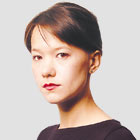
Susan Osman in her studio at China Radio International in Beijing Photograph: Photographer:Dan Chung
Former BBC and Channel 4 presenter Susan Osman has moved to Beijing to present a breakfast-time radio show. Why?
'Susan Boyle Won't Be Joining China Radio International," ran the headline in an English- language Chinese paper, joining such disconcerting classics of the genre as "Drunk Man Acts Stupid" and "Jennifer Aniston – Ferret Would 'Put Me Off' In Dating".
The Susan in question was actually Susan Osman, a former BBCpresenter recruited by Chinese state radio and mistaken by excited internet gossips for the star of Britain's Got Talent, leading to the news story putting the record straight. Osman's move at the end of last year made waves in the UK too, but for very different reasons – she complained that as a 51-year-old woman she had hit a silver ceiling and was left with little choice but to move halfway round the world to escape a "culture of ageism". Her accusations resonated because they followed other controversies such as the axing of Strictly Come Dancing judge Arlene Phillips. More recently, Miriam O'Reilly announced that she was suing the BBC for age and sex discrimination after she and three over-40 female colleagues were "let go" from Countryfile.
"There is an age in the UK where you are past your sell-by date," Osman says. "You constantly feel you're having to apologise and not mention your age – or [the fact that] my son's 20; you can kind of date me by that." Meanwhile, she says, thinning hair and saggy faces appear to be no obstacle for men. "There are some shockers," she points out.
The BBC, however, says that its programmes strive for diversity. A spokesman adds: "Broadcasting, especially presenting, is an extremely competitive industry and the nature of the industry is such that many broadcasters are freelance artists engaged on contracts of specific durations. Ageism has nothing to do with it."
Until she snagged the CRI job Osman feared her career might be at an end, 28 years after it began by chance. (She was teaching at girls' school Roedean when a television director working on a documentary there spotted her.) Ensuing jobs ranged from consumer journalism at Channel 4 to anchoring local news programmes. Most recently, she was a freelance presenter on the BBC News Channel, and then, just as opportunities seemed to be waning, her son returned from an internship in China and urged her to go east, promising they would appreciate her age.
"I don't think I have ever – ever – been treated with so much respect in a working environment," she says now, with faint surprise; almost all the staff on her show are men half her age. "They listen, seem to admire me and seem to understand what changes I'm trying to bring here."
Of course she had qualms about working for the Chinese state media: "I was very worried about editorial interference . . . Having come from a BBC background, objectivity and credibility are very important, as is balance. I didn't want to compromise that."
So she suggested hosting a chat show rather than a news programme – which seems a good fit as she has a touch of the Judy Finnegan about her – "but when I arrived it was pretty evident they needed some help".
The result is the breakfast-time English-language show, Beijing Hour. In style, it sounds much like a local BBC radio show, including traffic roundups and chit-chat with the business reporter. But while a news report about the Dalai Lama avoids the kind of angry rhetoric sometimes employed by state media, it is noticeable that it also omits the viewpoint of the Tibetan government-in-exile.
"Well, there isn't a Tibetan government. You have to be accurate," she says. "Let's be very clear: Tibet, legally, belongs to China. It always has done." Though this argument is Chinese orthodoxy, it is hotly disputed by other historians. Always, I ask? "Always," she insists. "It's a hugely complex subject and I think it's very dangerous to oversimplify and take sides . . . When in China, perhaps you have a different perspective from western counterparts because you have more detail. But how you can convey that detail in an accurate, balanced and fair way is the challenge."
It seems odd to talk of balance when you can report only one side. "I think this is a possible issue. But honestly, I have only been in this country for six weeks and I'm no aficionado of the history of Tibet and China, and I don't really think it's my place to comment on it."
Are there any issues she cannot touch at all? "Yes, three." Reluctantly, she elucidates: the private lives of leaders; the Tiananmen Square pro-democracy protests of 1989; and the banned spiritual movement, Falun Gong. But although those are the long-term red lines, the actual list is rather longer. Two years ago, when the clamour in the media over children's deaths in shoddily built schools in the Sichuan earthquake grew too loud, the government simply silenced it, for instance. Chinese media have not touched the subject since.
What if CRI refused to report what she judged to be a major story? "I would press that we would cover it, and would argue quite vociferously," she says. "Honestly, nothing has come up while the show has been on air that [would give me] any reason for dissent. But I have been told that there will be no interference."
Some see the increasing professionalism of members of China's state media as window dressing: they are still the voice of the Communist party. On this analysis, what may look like increasing freedom is really what media scholar David Bandurski and others dub "Control 2.0" – instead of only ignoring or suppressing difficult issues, they seek actively to influence public opinion. Some Chinese journalists fear things are regressing, with less room for challenging reporting than a few years ago.
Osman says she shares the frustration of those who want faster progress, but compares the current situation to her experience of visiting a television station in Beijing while on holiday a decade ago: "Reporters were called by numbers; news was censored [for] up to 12 hours. I don't want to be seen as naive and living in a kind of bubble. But from what I have seen, just in the short time I've been here, things have changed."
She suggests China "doesn't really know what news is". But there are excellent journalists whose stories get censored. Is the problem just that they don't know how to do news, or is it that they are not allowed to do it? There's a short silence, followed by a hearty laugh. "I'm just thinking about an appropriate answer," she says. Yes, she is sure that there are some very good journalists. "But at CRI my impression is they don't completely understand what news is."
So in came Osman with an agenda of improving news gathering, with better attribution and sourcing. She argues that the show is pushing at the boundaries in small but meaningful ways. For example, on the day British drug dealer Akmal Shaikh was executed, despite his family's assertions that he was severely mentally ill, they discussed mental disorders. When the US announced a major arms deal with Taiwan, "we had an analyst criticising China – well, not criticising, but saying how it reacted."
Osman's innovations are not truly ground-breaking, and English-language media often enjoy greater latitude because of their limited audience. But it is hard to be churlish when she is good-humoured and keen to engage on the issues. She is also candid, reiterating that while she wants to change the culture, she moved for her career, too.
Is she not just making state media appear more credible, though? "God!" she exclaims. "That's a really below-the-belt criticism." Is it? "Yeah, it is. Hopefully by me being here, people will see it as being more credible, and I will make it as credible as it can be within the confines of my situation . . . I'm not here to change the world – I'm doing one radio programme."
But she acknowledges that she treads "a very fine line between being editorially credible and not overstepping the mark". Even if no one has told her not to quote the Dalai Lama's spokesman, she knows she cannot do it – surely self-censorship goes with the job? It's a fair question, she says calmly; but adds that you cannot change a culture overnight.
"All I can say is that China is changing and I don't know how I'm going to feel in a year's time – I might not even last. I'm on probation. I might not even be here in six weeks. It might be just too unbearable."
Source: http://bit.ly/91oRKs
Via Yimber Gaviria, Colombia


0 comentarios:
Publicar un comentario